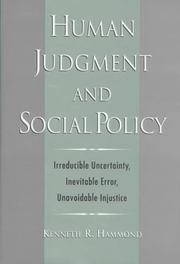| Listing 1 - 1 of 1 |
Sort by
|

ISBN: 0195097343 0195357043 1280451335 1602560501 9781602560505 9780195357042 9781280451331 9786610451333 6610451338 9780195097344 0197735754 Year: 1996 Publisher: Oxford University Press
Abstract | Keywords | Export | Availability | Bookmark
 Loading...
Loading...Choose an application
- Reference Manager
- EndNote
- RefWorks (Direct export to RefWorks)
This landmark work examines the dynamics of judgement and its impact on events that take place in human society, which require the direction and control of social policy. Research on social policy typically focuses on content. This book concentrates instead on the decision-making process itself. Drawing on 50 years of empirical research in decision theory, Hammond examines the possibilities for wisdom and cognitive competence in the formation of social policies, and applies these lessons to specific examples, such as the space shuttle Challenger disaster and the health care debate. Uncertainly, he tells us, can seldom be fully eliminated; thus error is inevitable, and injustice for some unavoidable. But the capacity for make wise judgments increases to the extent that we understand the potential pitfalls and their origin. The judgment process for example involves an ongoing rivalry between intuition and analysis, accuracy and rationality. The source of this tension requires an examination of the evolutionary roots of human judgement and how these fundamental features may be changing as our civilization increasingly becomes an information and knowledge-based society. With numerous examples from law, medicine, engineering, and economics, the author dramatizes the importance of judgment and its role in the formation of social policies which affect us all, and issues the first comprehensive examination of its underlying dynamics.
Incertitude --- Judgement --- Judgment --- Jugement --- Onzekerheid --- Oordeel --- Uncertainty --- Decision making. --- Judgment. --- Social policy. --- Social policy - Decision making. --- Uncertainty. --- Social policy --- Sociology & Social History --- Social Sciences --- Social Change --- Decision making --- National planning --- State planning --- Reasoning --- Knowledge, Theory of --- Language and languages --- Psychology --- Thought and thinking --- Wisdom --- Economic policy --- Family policy --- Social history --- E-books --- HM 1111 Social Interaction --- Decision Making
| Listing 1 - 1 of 1 |
Sort by
|

 Search
Search Feedback
Feedback About
About Help
Help News
News